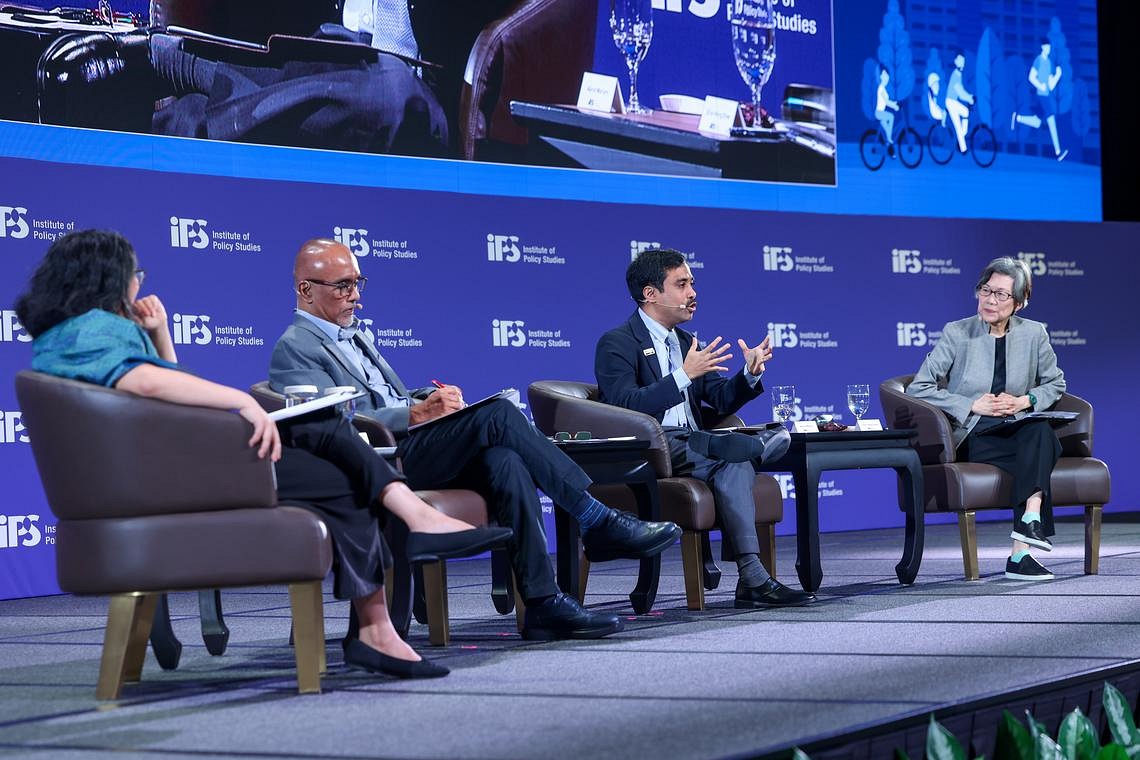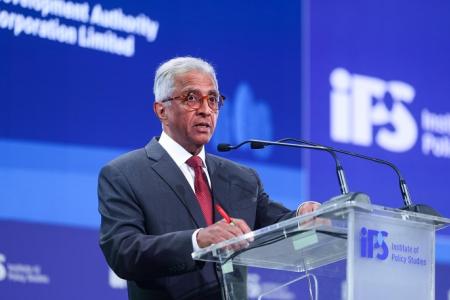S'poreans have fewer friends – a signs of straining social cohesion
The number of close friends that Singaporeans have has shrunk over the past six years, from 10.67 on average in 2018 to 6.49 in 2024, a study by the Institute of Policy Studies (IPS) has found.
The findings, which will soon be released in full, also show that younger people aged 18 to 35 were more likely to have fewer close friends compared with their older peers, regardless of socio-economic status (SES).
These are among signs pointing to the social cohesion in Singapore coming under strain, said IPS director Janadas Devan on Jan 20, as he remarked that the country should borrow a leaf from its handling of the Covid-19 pandemic, which is that high social capital “literally saves lives”.
In his opening address at the IPS’ annual Singapore Perspectives conference, which is themed “Community”, he attributed Singapore’s successful handling of the pandemic to its high social capital.
He referenced a study of 177 countries published in The Lancet medical journal in April 2022, which found that the high levels of trust in government and high levels of interpersonal trust – social capital, in other words – were the most significant factor associated with infection rates and vaccine coverage.
The high social capital found here during the pandemic was not only made of close ties among people of the same clans or racial groups, but also close ties across different groups, or “bridging” social capital, with the latter being more important, Mr Janadas said.
In navigating a world fraught with social and political fractures, while Singapore might not be in dire straits compared with what is observed elsewhere, it should work to replenish its social capital, he said.
“Social capital is not something you can bank for good and draw upon freely without also working tirelessly to replenish the account,” he said.
Mr Janadas identified at least three reasons behind why social cohesion here is being strained: income inequality, social media and immigration.
On the issue of income inequality, he cited the IPS study led by principal research fellow Mathew Mathews, which also found that regardless of age or SES, respondents in 2024 were significantly more likely to prefer interacting with people of similar income levels, compared with 2018.
Among those earning less than $2,000 a month, the proportion preferring same-SES interactions grew from 45 per cent in 2018 to 52 per cent in 2024.
Among those earning more than $10,000 a month, the proportion preferring to mix with people like themselves grew from 29 per cent in 2018 to 36 per cent in 2024, the study found.
The conference by IPS, a think-tank under the NUS Lee Kuan Yew School of Public Policy, was attended by close to 1,200 academics, civic society groups, businessmen, students and civil servants.
The hand of the state
One panel of experts discussed whether the Government’s own hand in many areas has “crowded out” opportunities for Singaporeans to engage each other organically, and if the state should pull back.
Panellist Aaron Maniam, a fellow of practice at the University of Oxford’s Blavatnik School of Government, said if Singapore gets it right, it can arrive at a state of collaborative nation-building, where constitutive communities and an enabling state can work together, and even coexist with a “respectful distance” where that is not possible.
Trust amid risk and uncertainty will be key to arriving and staying here, he stressed.
“If we don’t have trust, we will never be able to get there, and then maintaining that trust will be quite critical in order to sustain that.”
The state has a stake in ensuring that it does not fall into the temptation to act in a constrictive way, or even make a community feel the state is likely constrictive, Dr Maniam added.
This is because, if so, communities would want to act in exclusivist ways to safeguard their interests as much as possible, he said, noting that exclusivist communities aim to dominate others and uphold ethnic nationalism, and lead to apartheid and racism.

Professor Cherian George from the Hong Kong Baptist University’s School of Communication argued that former foreign minister George Yeo’s “pruning the banyan tree” analogy is not what is needed today.
In a 1991 speech, he had likened the Singapore state to a banyan tree and spoke of the need to prune it so that civic participation could grow under its canopy.
Prof George said: “The flaw in our model is the assumption that a capable state needs to be autocratic and cannot tolerate vigorous competition, nor contrary and dissenting voices in civil society.”
The state still overwhelms society in Singapore, he said.
On the regulation of theatre, he said the Government “legitimises and institutionalises” the notion that people need state protection from others with non-mainstream views when they label plays to be mature content on grounds of “exploration of socio-political issues”.
Singapore is not yet in the virtuous circle of high-capacity states and vibrant societies, where the two are “neither devouring each other, each ratcheting the other’s contributions to collective well-being”, he added.
“We don’t have the kind of horizontal, people-to-people trust that would allow community to flourish,” he said.
Yale-NUS closure and critical thinking
During the discussion, one audience member asked how Singapore could promote critical thinking required of vibrant states if initiatives aimed at growing it like the Yale-NUS College had to be abandoned, and the media avoids discussing controversial issues.
The liberal arts college will be merged with the NUS University Scholars Programme to form a new interdisciplinary honours college, with the Class of 2025 being the last cohort of Yale-NUS students.
In response, Ambassador-at-Large Chan Heng Chee, who moderated the panel discussion, said universities across the country do teach critical thinking.
“I assume that Yale-NUS does teach critical thinking, but so does NUS, so does NTU, so does SMU and SUTD,” said Prof Chan, who is also a member of the Yale-NUS governing board.
“I don’t think we should assume that critical thinking is not there in our schools and our universities,” she added.
Prof George said critical thinking, like civic participation, is a muscle.
He added that while students may know the theory, they, as well as citizens at large, “are not being given the freedom to practise that muscle”.
To that, Prof Chan argued that it is up to the tutor to engage students.
“In a lecture hall, I know it is hard to engage, but in tutorials, you do. So I don’t think it is absent,” she said.
Prof George noted that the Yale-NUS model of student governance is unique.
“It’s the only group of university students who could self-organise things without the permission of the university students’ office. They report directly to the dean, who is more sympathetic to them,” he said.
The college’s closure would mean that all students will now have to get their activities cleared by the central NUS body, which “has the record of listening carefully to what the Government considers is acceptable organising as a policy”, he said.
Prof Chan said that would be one difference, but critical thinking can be encouraged beyond the student governance platform.
Professor Paul Tambyah, an infectious diseases expert and chairman of the Singapore Democratic Party, asked if Singapore’s immigration policy can be amended to prioritise people who have family ties to the Republic and the talent to contribute over maintaining racial quotas.
Prof Chan said it is still important to think about “optical presentation”, as it could be destabilising to society if minority groups see their numbers shrinking.
Agreeing with Prof George that the issue is a “very emotional one”, she said: “I would not so easily stop worrying about quotas. Having the numbers there gives some comfort to our people.”
Another audience member asked whether the Chinese, Malay, Indian and Others (CMIO) categorisation can be removed from the identity card.
Dr Maniam said there are two ways to look at the issue: CMIO being the “be all and end all of who I am” and an indicator of all of a person’s complexities, or thinking of it as existing for certain administrative reasons.
He added: “The origin of the model actually was to honour the multiple ethnic groups that existed and ensure that they felt they had a clear symbolic place in all of society.
“But I can look at that and also say, today, I am much more adapted... I can contain the multitudes of my identity without having a single administrative label define me for all of what I am.”
While the CMIO label is imperfect, it was never meant to capture all complexity, Dr Maniam said.
At a subsequent panel discussion, NUS sociologist Daniel Goh presented his strategies in dealing with “super diversity” in Singapore.
One can rethink culture as not one of belonging, but one of becoming, where Singaporeans interact by thinking of where they are headed collectively, he said.
They can also think of citizenship as “affective” or having a lot to do with emotions. After all, citizenship is “made up of a cluster of emotions”, he added.
Associate Professor Goh said he hates the term “true blue Singaporean”, as the friends whom he considers Singaporeans might not be born here and would be excluded.
Inclusion should not be treated as an “end point”, but a work in progress, he said.
Get The New Paper on your phone with the free TNP app. Download from the Apple App Store or Google Play Store now

